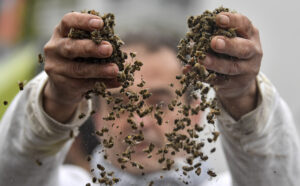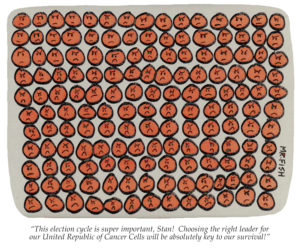World Health Organization Places Processed Meat Alongside Smoking as Cause of Cancer
A United Nations health body says bacon, sausage and ham rank right up there with cigarettes, alcohol and asbestos as top carcinogens. But not all experts are convinced. cookbookman17 / CC BY 2.0
cookbookman17 / CC BY 2.0
A United Nations health body says bacon, sausage and ham rank along with cigarettes, alcohol and asbestos as top carcinogens. But not all experts are convinced.
The Guardian reports:
The report from the WHO’s International Agency for Research on Cancer said there was enough evidence to rank processed meats as group 1 carcinogens because of a causal link with bowel cancer.
It places red meat in group 2A, as “probably carcinogenic to humans”. Eating red meat is also linked to pancreatic and prostate cancer, the IARC says.
The IARC’s experts concluded that each 50-gram (1.8-ounce) portion of processed meat eaten daily increased the risk of colorectal cancer by 18%.
“For an individual, the risk of developing colorectal cancer because of their consumption of processed meat remains small, but this risk increases with the amount of meat consumed,” said Dr Kurt Straif, head of the IARC monographs programme. “In view of the large number of people who consume processed meat, the global impact on cancer incidence is of public health importance.”
Professor Tim Key, Cancer Research UK’s epidemiologist at the University of Oxford, told The Guardian that the writing’s been on the wall for dark, processed meats for several years. “Cancer Research UK supports IARC’s decision that there’s strong enough evidence to classify processed meat as a cause of cancer, and red meat as a probable cause of cancer.”
“We’ve known for some time about the probable link between red and processed meat and bowel cancer, which is backed by substantial evidence.”
“This decision doesn’t mean you need to stop eating any red and processed meat. But if you eat lots of it you may want to think about cutting down. You could try having fish for your dinner rather than sausages, or choosing to have a bean salad for lunch over a BLT.”
Dr. Elizabeth Lund, an independent consultant in nutritional and gastrointestinal health and former research leader at the Institute of Food Research, is less concerned. Lund, who acknowledges she performed work for the meat industry in 2010, said that red meat was associated with just three extra cases of bowel cancer per 100,000 adults in developed nations.
“A much bigger risk factor is obesity and lack of exercise,” said Lund. “Overall, I feel that eating meat once a day combined with plenty of fruit, vegetables and cereal fibre, plus exercise and weight control, will allow for a low risk of colorectal cancer and a more balanced diet.”
Professor Ian Johnson of the British Institute of Food Research also said the risk was small. “It is certainly very inappropriate to suggest that any adverse effect of bacon and sausages on the risk of bowel cancer is comparable to the dangers of tobacco smoke, which is loaded with known chemical carcinogens and increases the risk of lung cancer in cigarette smokers by around twentyfold.”
Betsy Booren, the North American Meat Institute’s vice president of scientific affairs, went beyond merely dismissing the data and pointed out a number of IARC warnings that seem to merit a closer look.
“It was clear, sitting in the IARC meeting, that many of the panellists were aiming for a specific result despite old, weak, inconsistent, self-reported intake data,” she said. “They tortured the data to ensure a specific outcome.
“Red and processed meat are among 940 agents reviewed by the IARC and found to pose some level of theoretical ‘hazard’. Only one substance, a chemical in yoga pants, has been declared by the IARC not to cause cancer.
“The IARC says you can enjoy your yoga class, but don’t breathe air (class 1 carcinogen), sit near a sun-filled window (class 1), apply aloe vera (class 2B) if you get a sunburn, drink wine or coffee (class 1 and class 2B), or eat grilled food (class 2A). And if you are a hairdresser or do shift work (both class 2A), you should seek a new career.”
— Posted by Alexander Reed Kelly.
Your support matters…Independent journalism is under threat and overshadowed by heavily funded mainstream media.
You can help level the playing field. Become a member.
Your tax-deductible contribution keeps us digging beneath the headlines to give you thought-provoking, investigative reporting and analysis that unearths what's really happening- without compromise.
Give today to support our courageous, independent journalists.






You need to be a supporter to comment.
There are currently no responses to this article.
Be the first to respond.